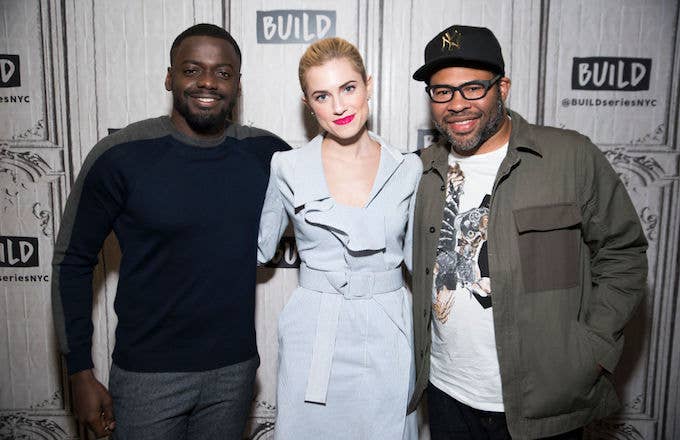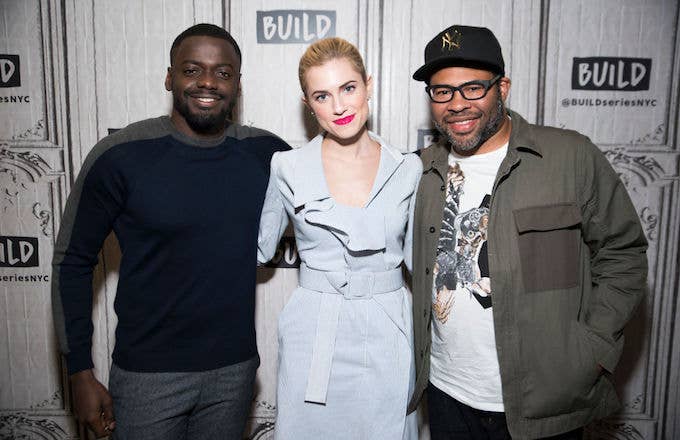
Get Out, the four-time Oscar nominated horror film, was not just the most profitable movie of 2017 or one of the most insightful commentaries on race in America in recent memory. It’s also literally college class material, as evidenced by last year’s “The Sunken Place: Racism, Survival, and Black Horror Aesthetic” UCLA course.
The class, offered by Professor Tananarive Due and her husband, Steve Barnes, was even visited by director Jordan Peele himself, who surprised students to answer their questions about the film. But for those of us not lucky enough to attend UCLA or to get into the class, Due and Barnes have developed a webinar to bring their black horror film class to the masses.
Shoutout to @JordanPeele for coming to my Black Horror Aesthetic class and lecturing us on his movie #GetOut ✊🏽 pic.twitter.com/P9P7aRGoV3
Their Sunken Place webinar, of which Get Out is the main focus, is not offered by or affiliated with UCLA, but is intended to further the conversation that Get Out began and that Due and Barnes’s class furthered.
“So now, it’s crazy and so many people have said, ‘Oh, I wish I could take that class,’” Due told Gizmodo. “And we teach classes through webinar, and have for years, and it’s just suddenly like, ‘Well, wait a minute — why don’t we just offer this class online?’
But it’s not just because Due and Barnes love teaching the class. There’s a real demand, and, more importantly, a class like hers gets into some of the most pertinent issues of the day.
.@JordanPeele in today's #BlackHorror class at @UCLA on The Sunken Place: "I realized it was the prison industrial complex." So many lives. pic.twitter.com/mDOL7a9JIK
“There are conversations that are happening now in 2018 concerning race that have never been happening in the history of this country, thanks to Get Out,” Barnes observed. “There is an opening for artists right now. If you’re willing to speak a dangerous truth, and you’ve got the skill to do it right, there is real opportunity.”
Some good news: the class will offer no exams or graded essays, and although there will be homework, it will consist mostly of watching about two movies a week. There will also be a reading component, which will consist mostly of short stories. The class will be mostly lecture and discussion-based, and, besides Get Out, will feature films like Candyman,Ganja and Hess, and Beloved. Due and Barnes are also hoping to keep up their winning streak of having famous guests in their classes. They hope to get Peele to visit again, but also Candyman lead actor Tony Todd.
“It’s an overview course, where the lynchpin is Get Out. Because Get Out—not only because of its success—gives us a common point of conversation,” Due said. That conversation can be “a way of processing everything from slavery, to white supremacy and whatever racialized trauma.”
The conversation involves analyzing how black people appear in American movies, from “being the monsters in Birth of a Nation to being the ones who fight the monsters,” Barnes explains. "That’s an amazing, heroic journey that we have taken in this country.” But the duo also hope to reach film teachers of black horror as well as the next generation of filmmakers. In an increasingly politicized world, classes like these are essential tools in the conversation against racism and diversity in Hollywood.
“Politics are the way you actualize or mobilize philosophy. You know, the question—the core questions of philosophy are, ‘Who am I?’, ‘What is true?’, and ‘What is the basic nature of mankind?’” Barnes said. “And in race in America, the basic question was, ‘Who are we? What are we?’ In other words, does nature trump nurture? Does essence precede existence?”
“I really do think horror is significant socially, period, and has a way of providing a lens that few other kinds of art can,” Due said. “Black horror in particular is especially powerful that way. And I want to spread it like a virus.”

